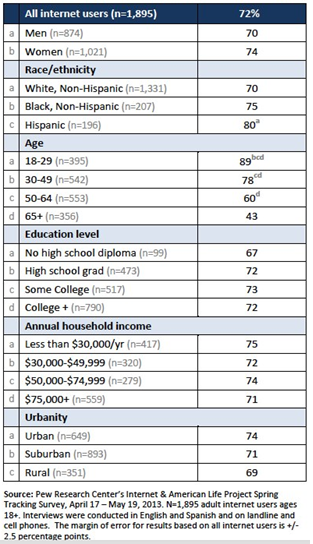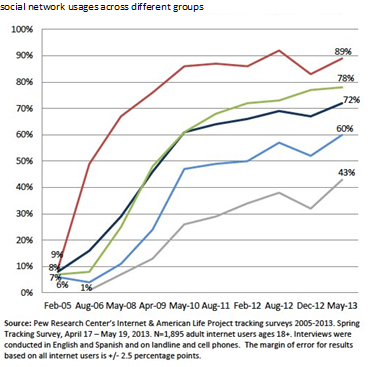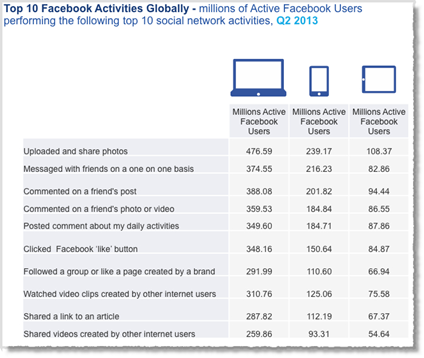
The Internet has revolutionized the way people seek and obtain information for almost anything under the sun. People are slowly but surely foregoing traditional sources of information like printed magazines and newspapers and opting to search for information either through queries made on search engines or through questions and updates they post on social media networks. In a world slowly being dominated by Internet-enable mobile devices like tablets and smartphones, getting instant results after seeking information is what users expect.
Information however can be classified into two general types. One type is based on facts and is supported by studies, scientific knowledge, reputable organizations, subject matter experts, or information considered true and acceptable by the general public. The other type is based on opinion and personal points of view, or is based solely on an experience narrated as blog posts, notes or testimonials. The Internet provides the perfect platform where people and business owners as well, can gain materials for both types of information through search engines, social media and other online channels.
These facts are well-supported by various researches, including one from Forrester, that highlighted social networks as go-to resource for online information for 50% of users in the 18-23 year old bracket, and 43% from the 24-32 year old groups. Search remains as the top resource for online information gathering, used by over 54% of online Americans. There are distinctive differences between these two resources, particularly on how online users use search engines and social media to get the specific type of information they want. Digital Marketing Philippines attempts to establish these differences as a way of helping marketers and business owners reach their intended targeted audiences for their brands, products or services.
How Online Users Make Use of Social Media
A recent social networking research project from Pew Internet placed social media usage from online users at even higher percentages, placing use of social media among adults with access to the Internet at a high 72%. From a gender perspective, 74% of women respondents from this research make use of social media while men placed at bit lower figure of 62%. The following table from Pew Internet provides a more detailed breakdown of social media usage demographics.

The following graph describes social network usages across different groups. The graph indicates a tremendous increase in social media use, with the 18-29 age groups of young adults raking in the biggest usage increase, from 9% to a high 89%. 
These figures is a clear indication of the strong power and hold of social media among online users, particularly on how they use social networking channels to look for information as described by the following:
- Social Media to Get Recommendations about a Brand, Product or Service
Many people value the opinion of friends, relatives and other people they respect. Social media is a great platform where they can get recommendations and information about what other people think about a particular brand, product or service before they make any purchases. This buying behavior is practiced way before any online services have already been established.
A Nielsen Global Online Consumer Survey validates the fact that consumers place high value on the opinion of people they trust, with 90% of the more than 25 thousand respondents from 50 countries saying they trust and will follow brand, product and service recommendations from people they know. This is a clear indication of the power of opinion as an advertising tool that can influence buying activities from online consumers.
- Social Media to Connect with Old and New Friends
One of the most important reasons why people use social media is get connected with old friends they haven’t seen for a long time, and new friends they’d only met online. Through their use of social media to connect with other people, online users developed more close relationships, increase social ties with people they want to connect with, and activate previous relationships that remained dormant for a considerable length of time. This ability to nurture more dynamic social relationships is a primary reason why people go to social networks to hear opinions and recommendations from their own close social circles online.
- Social Media to Curate or Create Content
Social media has emerged as a very dynamic platform that provides a perfect environment for both creating and curating content. As content creator, online users can post their pictures, videos, notes, angsts and what-have-you in their profile pages for other people within their network to see. Photo sharing is indeed the most popular Facebook activity worldwide as shown in the table below: 
As content curator, online users scan through the tons of information and status updates flowing through their social media feeds, allowing them repost whatever they find interesting that they would like to share with their online friends. Content curators can contribute highly in making interesting content from brands, products and services go viral and reach an even wider audience in the social media stratosphere.
- Social Media to Build a Bigger Online Network
Online users who are active at social media activities like sharing, liking, commenting, re-tweeting, re-posting or whatever social networks term particular activities that engage directly with online users, are reciprocated by also receiving likes and shares for their own posts. These exchanges are usually made public through the newsfeeds, with a greater likelihood of being seen by friends-of-friends or the general public, depending on the privacy setting. From here, they receive even more friend requests, invitation to join groups or pages, and facilitate an even larger room for building a bigger online network.
- Social Media to Get Updated on Political Buzz
Social media is a very powerful resource for getting information or updates about the political scene. They can also connect with like-minded people who share the same opinion, views and support for a particular political issue or development. Politicians, campaign managers, supporters, and any concerned citizen can get a bigger and wider outreach in the political arena through the use of social networks.
- Social Media to Connect with a Particular Demographic
If you have a brand, product or service that caters to a particular age group or demographic, social media can be a very effective digital marketing channel to specifically target a particular demographic. An example is the 55 to 64 year old age demographic that has grown tremendously by up to 79% at Twitter, 46% at Facebook, and 56% at Google+. Definitely, these figures show that social networks are not just for teenagers but for other demographics as well – particularly the ones that would have the most likelihood of availing your products or services.
- Social Media to Get Advice on Almost Anything
Facebook and Twitter are not the only social media players in town. There are several other social networks available online that people can use to connect with other online users and give or receive advice on practically anything people have great interest with. Sites like Yelp.com, Epinions.com, Shopping.com, Yahoo Answers, Aardvark, LinkedIn Answers, and Quora are just some of the social networks where people get reviews, opinions, and recommendations about products, shops, restaurants, destinations, and other services – that business owners can leverage to reach a wider and bigger audience reach.
How Online Users Make Use of Search Engines
One of the most important things that happened to the Internet that made the online world what it is at present is the advent of the search engine. Without search engines, the continuous and never-ending quest for information would not be as easy and convenient as it is today. Just imagine online life right now without the presence of search engines. It would just be like returning to a non-digital age where “search” means going through volumes upon volumes of printed books in a library.
Thanks to search engines, online users can simply type in a search phrase that they want to look at and with a hit of a button, they’ll receive an extensive listing of potential websites that may contain the information of what they are looking for. This happens in just moments, making research and other process much more convenient, faster, easier and more productive. The way people use search engines can be classified into four major groups: Go, Know, Shop and Fun – and these will be discussed in greater detail in the following:
- GO – Using Search Engines to Seek a Specific Destination
People who know what they are looking for exactly can immediately specify the information at whatever search engines they choose, receiving results that most likely contain the search phrase or information they use. An example is looking for a particular name of a hotel at a particular tourist spot in Southern Philippines. Using search engines to seek this specific destination can return results that can indicate the hotel’s main or official website, Facebook pages, booking engines, and reviews from previous visitors to the place.
- KNOW – Using Search Engines to Look for Information
Search engines are best to use if you want to look for good brands that carry a certain particular product or service that you need. Using search engines by typing in keywords that describe the product or service will return brands or companies that rank well, showing you listings of their main websites or other sites that talk or review this particular brand. Search engines are very effective tools for doing research particularly if you really do not know where to start yet. Some users also used search engines to seek non-commerce information including those for thesis, school homework, history and others.
- SHOP – Using Search Engines to Purchase Products or Services
If you have the need to purchase particular products or services, search engines can provide you with a listing of the most relevant sites where you can make online purchases. Purchase a song, buy a ticket, order a book, and register for a conference, or any other products or services that you can pay for online can easily be searchable by using search engines. This fact is supported by the Digital Influence Index white paper that highlighted that 89% on online consumers make use of search engines to help them decide and make purchase decisions – a fact that business owners should clearly consider in their digital marketing campaigns.
- FUN – Using Search Engines for Entertainment
Looking for all sorts of entertainment has never been so much fun and convenient with the advent of search engines. Whether you are looking for games, movies, tv shows, online radios, tutorials, fan pages, videos, pictures, social networks and other forms of entertainment people are searching for online, search engines are the perfect tool to provide you with relevant information that you’ll need.
Making Search More Social
When looking for information online, search engines and social networks are two great but distinct sources of information that can help you. Of course, these tools are still incomparable with getting the advice of a good friend or loved one that you fully trust. Human connection, the social touch, is still what matters greatly to people – important enough that it could sway their buying decisions online.
That is why major search engines are integrating the “social” element from social media right into their own search frameworks, such as the partnership between Microsoft’s Bing and Facebook to make search engines more social. This will create a more customized, visual, personal, and social experience for search users. Google is also integrating social elements in search results, like the inclusion of user reviews when people make use of Google Local, and the appearance of social data from Twitter and Facebook in search results.
As a final note, search engines and social media have influenced much of how people interact with each other, look for information online, address day-to-day issues, and their buying behaviors and decisions. There are subtle differences between these two tools that business owners should understand and leverage for their digital marketing efforts, but it would also be important to consider that the future between search and social media – can become one.
Jomer B. Gregorio is a well-rounded expert when it comes digital marketing. Jomer is also known as a semantic SEO evangelist and practitioner. Check out our Digital Marketing Services today and let us help you in achieving positive and profitable results for your business.
